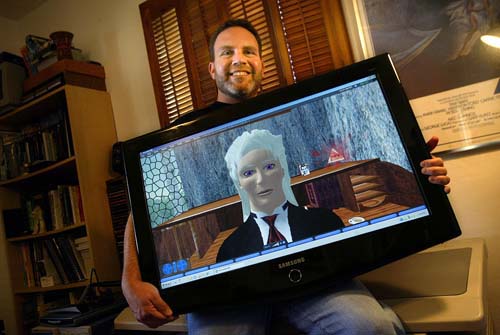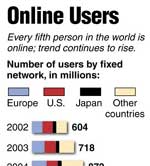 MCT
MCT
Article
Millions are attempting to escape their daily lives through virtual worlds, but are left unsatisfied. Here’s why.
Learn the why behind the headlines.
Subscribe to the Real Truth for FREE news and analysis.
Subscribe NowSome years ago, the concept of “virtual reality” captured the imagination and attention of society. People were excited and intrigued about the idea of exploring a digital world that looked and sounded real.
A decade ago, one could walk through an amusement park and see a booth that offered this virtual reality experience, with large goggles, ear equipment and numerous wires connected to gloves—all at a relatively expensive cost.
In the end, despite the hype, technology was not advanced enough. It became clear that, in many regards, this could not become a viable form of entertainment for the everyday consumer.
Virtual reality did, however, become a hit in movies and television shows. Various plots have been based on characters who are trapped in a virtual world and cannot escape. Among the most popular of these movies is The Matrix trilogy.
Virtual reality, even today, is still ahead of its time, and is largely left to human imagination.
Meanwhile, the Internet and personal computing capability has since flourished and brought the advent of other fanciful technological concepts and ideas. The Internet itself is causing knowledge and information to expand in new ways.
Today, over 1.1 billion people now have access to the Internet. People around the world can communicate nearly at the speed of light. Chat rooms are “buzzing” with people talking to each other from every corner of the earth. News from one hemisphere is instantly read by people in the other. Street video cameras in the cities of Japan can be viewed live by someone in Canada, and vice versa.
At the same time, video games have become popular. Beginning on personal computers in the late 1970s and 80s, they quickly made use of the Internet in the 1990s, which allows for real-time multi-player games. As technology advanced, so did the detail, reality and complexity of these games.
The combination of video games and the Internet has led to another virtual concept—that of virtual worlds.
Exploring Virtual Worlds
 MCT
MCTSecond Life offers a world in which you can buy property and do whatever you want with it. You can create an “avatar”—a user’s virtual alter ego. You can start a business and sell goods and services to other online citizens, such as open a nightclub and throw parties with live musicians. If you are an artist, you can open an art studio and allow other avatars to visit, browse around and buy your artwork.
The opportunities are almost endless: Build a dream house, with a beautiful beachside view, if you wish. Drive through the streets of online cities. Socialize with other people, who themselves have their own character or avatar. Get a tan, play games, ride a dolphin—almost whatever you desire.
In fact, Second Life and other virtual community programs seem to offer even more than reality can provide. You can design your avatar to look like whatever you want, including animals or fictional characters. You can be as beautiful or handsome as you want, wearing as much or as little clothing as you wish. You can defy gravity and fly without a plane or helicopter. You can start online relationships (even including graphic acts!) with whomever you want, whenever you want.
It is literally a second life in a virtual world, and many prominent figures and institutions are taking it seriously. U.S. Presidential candidates are beginning campaigns in Second Life. Worldwide news provider Reuters operates a bureau there, with online/avatar journalists. Catholic Missionaries have entered this world to further their cause. The tiny country of Maldives has set up an embassy. A host of universities are using the world of Second Life for virtual classrooms.
This world even has an entire economy, with its own currency: Linden Dollars. Approximately 270 Linden Dollars equals one U.S. dollar. Certain individuals earn real money by buying and selling digital property. Others earn money by opening a business in Second Life. At the writing of this article, $1.2 million (USD) were spent in Second Life in just 24 hours! (As a side point, $115,000 was raised in a fundraiser in Second Life for the American Cancer Society.)
The point is that these are real, developing and popular virtual worlds—not some science fiction idea gone awry. Not only are these virtual societies complex and advanced, but millions are “living,” to one degree or another, in these worlds—called “metaverses.” Over nine million people have accounts in Second Life alone!
This is not a passing fad. There are a number of other online services and virtual worlds that are growing in popularity. There are indications that Google and Microsoft may also be releasing their own virtual worlds to rival Second Life. And it is reported that $1 billion has been spent on the development of 35 different virtual worlds in just the past year. Additionally, $15 million has been spent on advertising within these programs in 2006, with this figure projected to be $150 million by 2012.
The San Francisco Chronicle reports, “Technology research firm Gartner forecast this year that by 2011, 80 percent of active Internet users will have a ‘second life’ in some sort of virtual world.”
The research company eMarketer reports that almost one quarter of American children ages 3 to 18 (over 8 million) will use virtual worlds on a monthly basis this year. To really understand the growth of this trend, it is important to note that over half will make virtual worlds a part of their lives by 2011. This would equate to 20 million children!
Other companies are also beginning to use the concept of virtual worlds, such as for meetings with employees who are not in the same geographic location. The U.S. military uses a type of virtual world for training.
The Quest for Another Life
Where is all of this leading?
Virtual worlds of and by themselves are not wrong, and this article is not intended, in any way, to attack or malign the concept or software. Certainly, there are good intentions that can be fulfilled in such environments—bringing people together to learn in a classroom while they may not have the physical ability to do so, or raise money for a cause, among others.
 Bitcom; MCT
Bitcom; MCTFirst, as more and more people enter these digital communities, what are they leaving behind? If you spend an hour in a virtual world, you have automatically given up an hour in your real life. Spending an hour building a virtual house is one less hour a parent could have used to rear and teach a child.
The move toward virtual worlds is just another example of how people tend to avoid—escape—from everyday life. Some become workaholics, overly focusing on their careers. This can produce long-term adverse effects. People also escape through drugs or medication, trying to numb the mind, numb their existence. Others escape their lives by starting a second one with an adulterous affair. The list could go on, but these online societies are quickly becoming a new form of escapism.
This is not to say that every time a person logs on to a virtual world he is trying to escape life’s pressures. That would be as ridiculous as saying working overtime one day automatically equates to being a workaholic. Nonetheless, the general trend and direction of society holds true.
 MCT
MCTVirtual worlds are becoming the latest instrument that people are using to run away from life’s most important issues—building character, rearing children, loving a spouse, exercising, etc. People are literally leaving reality behind and living in a fantasy world.
Again, 80% of Internet users will be involved in virtual worlds within a few years. What will be the effect? What children and spouses will they be neglecting? The 21st century is producing an adult generation that grew up on video games. Now we have video lives, not just games.
If eight of every ten people spend countless hours creating virtual lives, what will happen to society? The unreal will slowly become the real, and reality will slowly become unreality.
Dissatisfied
Every human being on earth wants to be happy. A lifetime is made up of days, and each of those days people make decisions in attempt to please themselves, often making day-to-day decisions based on feelings and human reasoning.
The excessive pursuit of virtual worlds is another example that people are dissatisfied with their existing lives. People are not content with their looks, so they turn to a virtual life in which they can look “sexy,” never getting sick or aging.
Some experts say that such worlds can fill emotional needs. It is certainly true that human beings have these types of needs—but they generally look in the wrong places. They address the effect, not the cause. They turn to the works of their own hands and imaginations to fill needs rather than turning to the Creator of the universe, who created man, physical laws of nature, and so much more.
Human Nature Always Surfaces
Regardless of religious belief, including whether or not God exists, almost everyone would say there are elements of what human beings do to each other that should not happen. Watching the news can cause you to become sick to your stomach upon hearing the debase acts human beings do to each other. For example, most would cringe and be terribly upset at the fact that cases of rapes against small children are rising in the eastern region of the Democratic Republic of Congo.
 MCT
MCT MCT
MCT MCT
MCTThere are few who would think that corruption of institutions, which can include taking money from those who need it and giving it to a choice few, is tolerable. Take, for instance, the oil-for-food scandal in which Saddam Hussein was involved. His regime took money and food that should have benefited the Iraqi people.
Human nature can be ugly, and exists wherever there are people. (To learn more, read “Human Nature – Exposed!”, archived online.)
Hundreds of years ago, people came to the New World, bringing with them ideas for a better world. But in the end, human nature followed. It does not matter where you look on earth, you will find the selfish effects of man’s nature—human beings not treating each other as they would like to be treated.
The same is true with virtual worlds. Carnal nature enters with human beings. Take for example the popular online game The Sims. Originally designed to be crime free, human nature circumvented the game’s limitations, leading to corrupt behavior, including extortion.
The virtual world of Second Life is also experiencing its dose of human nature. It has PG-rated islands as well as “Mature” islands, where pornography and sex clubs exist. Gambling was allowed, until the summer of 2007. The digital world has what is called “griefers,” those who cause trouble for others, trying to make their lives unpleasant through vandalism, trapping or even killing. A CEO for an IT company stated, “It’s got the chaos of people doing anything you can imagine.”
The BBC even reported that there is an investigation regarding virtual child abuse as well as the exchange of real child pornography!
It is also evident that when there is more anonymity, people will “push the envelope” in their words and actions. Many virtual world developers are taking steps to ensure people can be identified.
Ultimately, the carnal nature of man, in all its component parts, always surfaces.
Cannot Direct One’s Steps
It does not matter where human beings live—in a virtual world or in the real world. One thing has stood true through the ages: “It is not in man…to direct his steps” (Jer. 10:23). Where people are a law unto themselves, the ugliness of human nature always prevails. Carnality is real and exists wherever there are people.
It is natural for men and women to seek happiness and emotional fulfillment, while trying to avoid the terrible things people do to each other. However, creating other worlds to enter and live in will not solve mankind’s greatest problems.
Man will continue to look for a better world—but he is looking in the wrong place. A seemingly unreal scenario will occur in the very near future. The God that created 10 billion trillion stars has a plan for humanity. He has prepared a new world that will provide happiness and fill emotional needs. He has a set of rules and guidelines regulating behavior that will bring about prosperity. Goodwill and kind deeds will take place between human beings.
You do not want to miss the knowledge of this wonderful world to come—a world that will not be virtual, but very, very REAL. Read our book Tomorrow’s Wonderful World – An Inside View!



